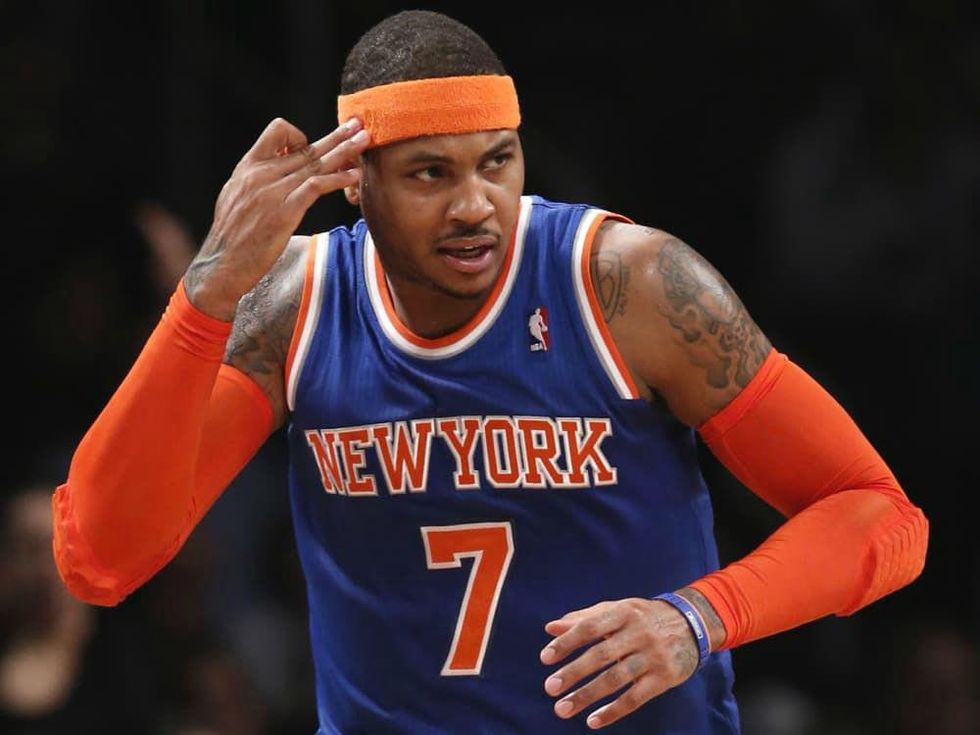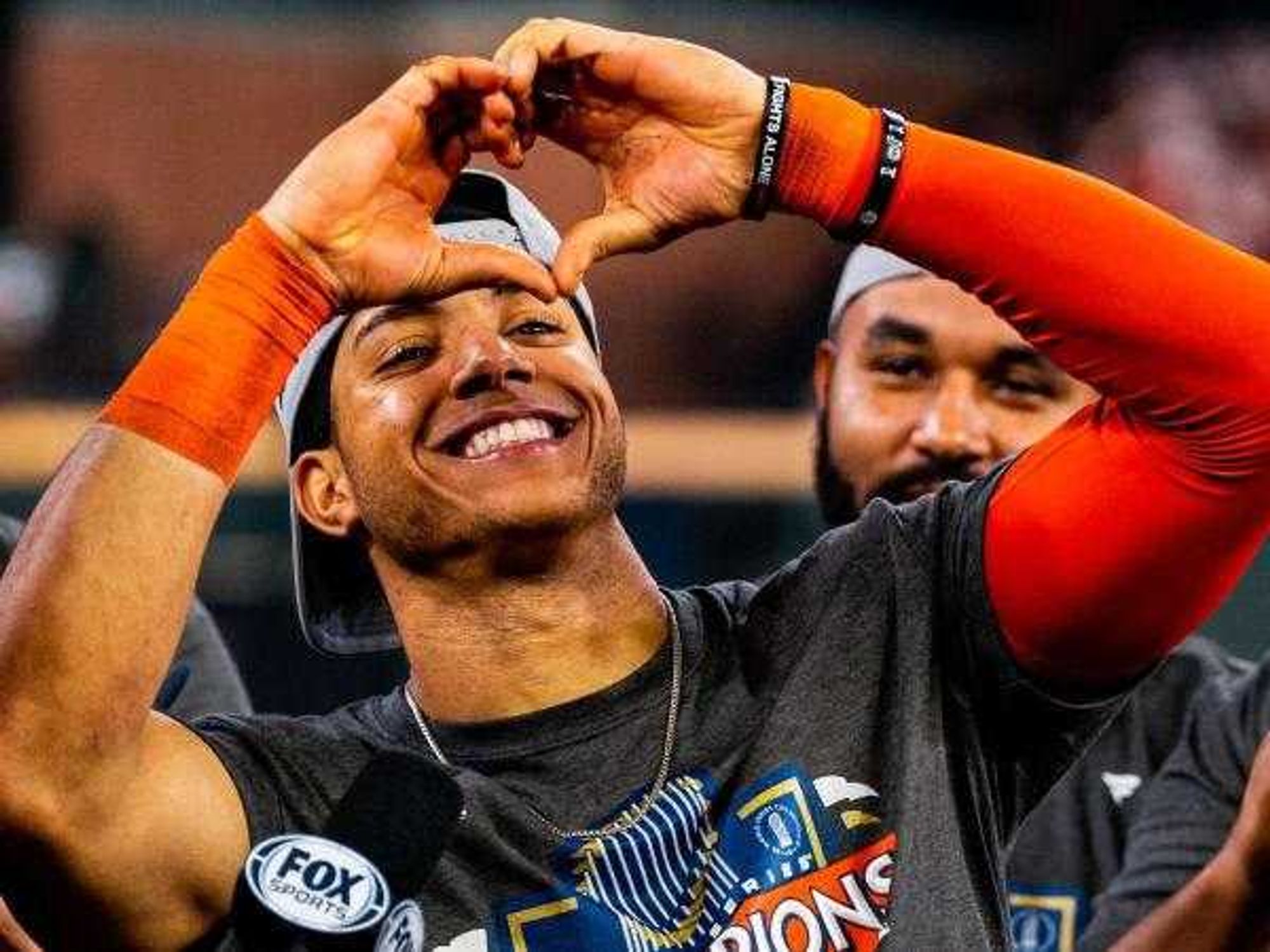A Season Gone
Jeremy Lin knows what really haunts the Rockets: And Carmelo Anthony is no sure fix
It was Jeremy Lin who eloquently presented an unvarnished perspective of the miserable weekend that haunted the Houston Rockets, of the shame that followed them from Portland back home after Damian Lillard victimized them before the sports world and laid bare their failure to meet great expectations.
His teammates followed and shared with the assembled media similarly personal tales of regret and despair late this week, remorsefully affixing a ragged and weathered bow on the 2013-14 season by recalling the despondence that clouded the days after it concluded late last Friday night at the Moda Center. But Lin put it best with an anecdote that crystallized the opportunity lost and the void that follows when things end prematurely and unexpectedly.
"It probably hit me (Sunday) when my calendar notification went off and it was like, 'Game 7,' " Lin said. "I was like, 'Oh, I forgot to delete that.' And that kind of sucked a lot. That's probably when it really hit me. I was like, 'Man, it's over. It's over.'
"It's weird. No more film, no more anything. It's just over."
Beverley, while celebrated as a maven, isn't so elite that he can single-handedly shoulder the responsibility of shackling the top point guards in the West.
Accepting the fact that their season ended well before most everyone predicted proved to be as perplexing a riddle for the Rockets as deciphering a vanilla inbounds play. As they said their goodbyes and departed for points all around the world, the Rockets were left facing the reality of their failures. They had accomplished so much during the regular season that they garnered attention as a dark horse to escape the grueling Western Conference playoff bracket and challenge for an NBA title.
The torrid play once the calendar flipped to 2014, the back-to-back home wins over the Miami Heat and Indiana Pacers, and the Top 5 offense and Top 12 defense made the Rockets trendy picks, as did the second-half emergence of James Harden as a legitimate superstar working in concert with a version of Dwight Howard that conjured memories of his domination with the Orlando Magic. An ascendant path was laid.
It is all too easy to cast Lillard in the role of dastardly villain, but he was merely a co-antagonist alongside Trail Blazers forward LaMarcus Aldridge. It was the Rockets who authored the script of their untimely demise with their leaky defense and, according to the Rockets themselves, several disparate agendas.
Harden is easy an foil for the Rockets' defensive limitations, his last act of ineptitude — instructing Chandler Parsons and defensive-minded guard Patrick Beverley to switch defensive assignments just prior to Lillard dashing to a vacant spot behind the 3-point arc and inserting a dagger in the collective hearts of Houston sports enthusiasts — serving as one crushing reminder of his general disregard for performing on that side of the court.
Had Harden simply rotated off Wes Matthews as Lillard came darting by, he might have discovered that disrupting Lillard would not have required Herculean effort. Instead he watched passively as Lillard ended the game and Western Conference first round series with an open three that amounted to a layup, given his pedigree.
However, when your defense allows an opponent to average a first-round-worst 111.8 points per 100 possessions, there is no one scapegoat. In January and February, when the Rockets ran roughshod over the league and built their resume as contenders, their defensive rating was relatively outstanding. Their offense sold hype but it was their defense, with Beverly and Howard working in tandem on the perimeter and in the paint, that made them legitimate.
When Beverley (knee) and Howard (ankle) were lost for eight games down the stretch, the Rockets' defensive intensity took a seat with both on the bench. Defensive might did not return when Beverley and Howard resumed play, that much was evident when Aldridge torched the Rockets during Games 1 and 2 at Toyota Center, and reinforced when Lillard, Wesley Matthews and Nic Batum took turns eviscerating the Rockets' perimeter defense the balance of the series.
For all of their pie-in-the-sky hopes of luring free agent forward Carmelo Anthony to Houston, the Rockets had better spend their offseason plugging their defensive holes. Howard will continue to drift away from his prime and Beverley, while celebrated as a maven, isn't so elite that he can single-handedly shoulder the responsibility of shackling the top point guards in the West: Lillard, Chris Paul, Stephen Curry, Tony Parker, Russell Westbrook.
The Rockets (Carmelo Anthony less) Future
There should be a debate raging within the halls of Toyota Center, and it should entail where the team turns to improve defensively during the offseason. Unsurprisingly the players believe that the capable personnel is already in house, however the inmates, no matter how earnest, should not run the asylum.
"I don't think we should make any big changes," Parsons said. "I'm sure they're going to want to add some guys to make our team better but we've got great guys in the locker room. We've got talented players. We've just got to find a way to put that all together."
"When you win, you get whatever you want. We had a chance to do that this year and didn't do it."
Said Harden: "I think we have more than enough to compete at a high level. We've got everything. It's a matter of us locking in and making sure that we're all on the same page."
Undoubtedly, the most shocking takeaway from the exit interviews was the repeated refrain of conflicting agendas. The Rockets were savvy enough to surreptitiously and retroactively plant seeds of discontent, yet not honest enough to fully expose their locker room issues. The Rockets certainly had their share of challenges to overcome, from the Harden-Howard marriage, the Lin benching in favor of Beverley, the emergence of power forward Terrence Jones and fluctuating minutes of Donatas Motiejunas, and the loss of valued assistant Kelvin Sampson.
Omer Asik infamously expressed discontent over his benching, and the Rockets endured a series of injuries that undermined the cohesion they so desperately craved. Those concerns varied in severity.
What the Rockets do with Asik and/or Lin as both enter the final seasons of the three-year contracts they signed prior to the 2012-13 campaign is critical. Asik likely greased the skids for his departure with his early-season antics; if not, his salary nevertheless isn't commensurate with that of a backup. The same could be said of Lin, whose perplexingly uneven performances could be tied to a number of factors, one of which he coyly addressed on Monday.
"I would go through stretches where I would play about 35, 40 minutes consistently and then back down to 15 or 20. A lot of up and down."
"It was definitely an up-and-down year. A lot of adjusting," Lin said. "I would go through stretches where I would play about 35, 40 minutes consistently and then back down to 15 or 20. A lot of up and down. One thing I want to work on is being able to be more even-keeled throughout the course of the season.
"A player I want to look more at is (Spurs shooting guard Manu) Ginobili and what he's done. Maybe not so much his game; we're very different. But his approach in terms of coming off the bench, what that looks like, and how to be effective every night and how to maintain a consistent level of aggression."
Though dissimilar to Asik and Lin, Parsons' contract situation is equally pressing. The Rockets are wedged in between picking up his 2014-15 option for a relatively paltry $964,750 only for him to become an unrestricted free agent next offseason or declining that option this summer and allowing Parsons to become a restricted free agent, and then deciding whether to let him walk or match potential contract offers.
Parsons will either get paid this summer or next, and if he remains a part of their core, the Rockets will be forced to make a decision on what direction they take with their salary cap. Committing to Parsons now would require some financial reshuffling, particularly given the consideration that their current roster might not be championship caliber.
Parsons stuck to the script when asked to comment on his immediate future, justifiably noting that what is in his heart may not necessary represent his best financial interests. His statement represented the Rockets as a whole entering the offseason. With the Rockets having already committed to a fourth season with coach Kevin McHale on their bench, they presently face some difficult decisions regarding the players that helped elevate them to favored status in the Western Conference.
Of course, those same players were central to those unfulfilled expectations, leaving a summer of woe and consternation ahead.
"The biggest thing for me is just to win," Parsons said. "When you win, you get whatever you want. We had a chance to do that this year and didn't do it. Restricted, unrestricted really doesn't matter to me. I just want to be in a good situation.
"I want to be on a winning team and I think that can happen here."


